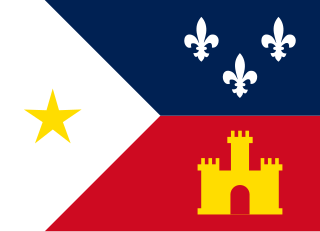
The Cajuns, also known as Louisiana Acadians, are a Louisiana French ethnicity mainly found in the U.S. state of Louisiana and surrounding Gulf Coast states.
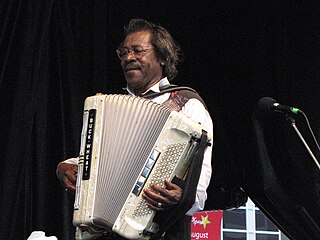
Zydeco is a music genre that was created in rural Southwest Louisiana by Afro-Americans of Creole heritage. It blends blues and rhythm and blues with music indigenous to the Louisiana Creoles such as la la and juré, using the French accordion and a creole washboard instrument called the frottoir.

Cajun music, an emblematic music of Louisiana played by the Cajuns, is rooted in the ballads of the French-speaking Acadians of Canada. Although they are two separate genres, Cajun music is often mentioned in tandem with the Creole-based zydeco music. Both are from southwest Louisiana and share French and African origins. These French Louisiana sounds have influenced American popular music for many decades, especially country music, and have influenced pop culture through mass media, such as television commercials.

Acadiana, also known as the Cajun Country, is the official name given to the French Louisiana region that has historically contained much of the state's Francophone population.

BeauSoleil is a Cajun band from Louisiana, United States.

The Council for the Development of French in Louisiana is Louisiana's Office of Francophone Affairs. It is a state agency whose multiple legislative mandates include developing opportunities to use the French language in tourism, economic development, culture, education and international relations. CODOFIL is governed by a board of 23 members and administratively placed within the Louisiana Office of Cultural Development's Department of Culture, Recreation and Tourism, overseen by the Lieutenant Governor. CODOFIL is the only state agency in the United States whose purpose is to serve a linguistic population.

Amédé Ardoin was an American musician, known for his high singing voice and virtuosity on German-made one-row diatonic button accordions. He is credited by Louisiana music scholars with laying the groundwork for both Creole and Cajun music in the early 20th century, and wrote several songs now regarded as Cajun and zydeco standards. His music and playing greatly inspired post-war Cajun accordion builders like Marc Savoy.
Elemore Morgan Jr. was an American painter, photographer, and educator. He was recognized in the Southern United States as a leading contemporary landscape artist. He was a professor of art at University of Louisiana at Lafayette, from 1965 until 1998. His paintings of rice farms in Vermilion Parish have been widely exhibited, from Paris to Los Angeles.
Carl Anthony Brasseaux is an American historian and educator. He specialized in French Colonial North America, particularly of Louisiana and the Cajun people. He helped to pioneer the field of Cajun history, and his published works on this topic represent the first serious, in-depth examination of the history of the ethnic group.

Glenn Russell Conrad was an American historian, professor, and author. He is known for his research of south Louisiana culture, as well as an expert on archival studies, nineteenth-century European history, and the history of colonial Louisiana. He taught at Southern Colorado State and the University of Southwestern Louisiana from 1958 until 1991, and serving as the director of the Center of Louisiana Studies at University of Southern Louisiana from 1973 until 1993.
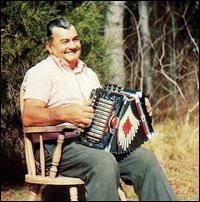
Nathan Abshire was an American Cajun accordion player. His time in the U.S. Army inspired Abshire to write the crooner song "Service Blues", which the newspaper Daily World reported as "one of his most memorable tearjerkers". After the war, he settled in Basile, Louisiana, where he played regularly at the Avalon Club. He released his best-known record, "Pine Grove Blues", in 1949. Abshire's music became more well known outside of Louisiana at the 1964 Newport Folk Festival. Abshire was never able to write so he was unable to sign autographs, resulting in him having to politely decline the requests. Despite thoughts of Abshire being "arrogant or stuck-up" for not signing autographs, he was unable to read and write. However, Abshire was taught how to write his own signature by Barry Jean Ancelet. Despite receiving more income from music than the majority of Cajun musicians, Abshire was not able to entirely depend on that income to live on. Abshire had multiple jobs during his life and his final job was working as the custodian of the town's dump. Abshire's legacy continued after his death in the form of a museum, a book, and a magazine special issue.

Dennis (Denus) McGee was one of the earliest recorded Cajun musicians.

Cajun music has its roots based in the ballads of the French-speaking Acadians of Canada, and in country music.
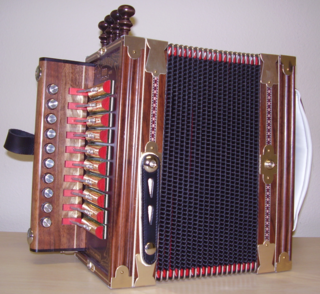
A Cajun accordion, also known as a squeezebox, is single-row diatonic button accordion used for playing Cajun and Creole music.
Jean Duet "Dewey" Segura was an American folk musician. He and his brother Edier Segura formed the duo known as the "Segura Brothers". The duo created some of the earliest commercially recorded Cajun music in the late 1920s.
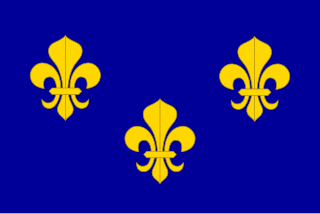
Louisiana French is an umbrella term for the dialects and varieties of the French language spoken traditionally by French Louisianians in colonial Lower Louisiana. As of today Louisiana French is primarily used in the state of Louisiana, specifically in its southern parishes.
Inez Catalon was an American Creole ballad singer, who was one of the most well-known performers of the genre known as Louisiana "home music". These are a cappella versions of ballads and love songs, drinking songs, game songs, lullabies and waltzes performed by women in the home, passed down from earlier generations to provide entertainment for the family before radio and television existed. Home music is not considered part of the public performance repertoire of Cajun and zydeco music because the songs were sung in the home by women, rather than in the dance halls of southwestern Louisiana which featured almost exclusively male performers.
Irene Whitfield Holmes was an American ethnomusicologist, educator, and a significant collector of Cajun, Creole, and Louisiana French folk songs.













